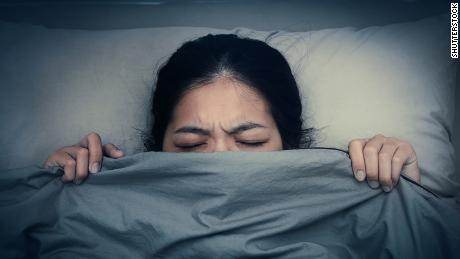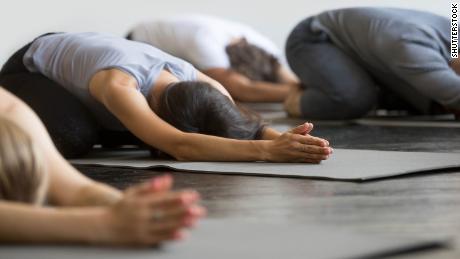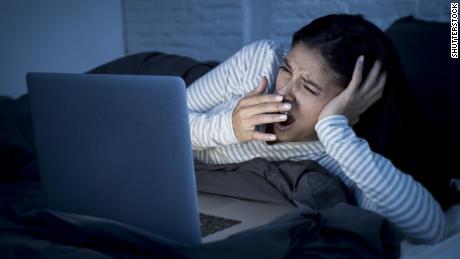Parents and other caregivers are more stressed and in poorer health due to pandemic, report finds
Updated 1003 GMT (1803 HKT) September 9, 2020
(CNN)When Raquel Minina's 11-year-old son Syrus came home from school in Paulding County, Georgia, last week with a sore throat, runny nodse and diarrhea, she was devastated.
A hairdresser by trade, she knew a diagnosis of Covid-19 would put her out of work for a month or more, despite all the careful safety precautions she'd been using to keep her clients safe.
"If I don't work I don't get paid," Minina said. "And if I'm quarantined at home, I would have to pay for food delivery, or I might be too sick to cook and have to pay for take-out, all of which I can't afford."
It wasn't the first time Minina, a single mom, had faced the financial and emotional stress that Covid-19 has brought into people's lives. At the beginning of the pandemic she was out of work for six weeks and had to skip two mortgage payments. The stress began to affect her health.
"I could feel my heart racing, palpitations that felt like a heart attack, but it was anxiety," Minina said. "I suffer from PTSD (post-traumatic stress disorder) and even with my medication, I was having panic attacks."
One-fourth of caregivers in worse health
Similar situations are occurring daily in homes across the United States as the added pressure of the pandemic takes its toll on our lives, according to a national analysis of at least 6.7 million caregivers insured by the Blue Cross Blue Shield Association.
The analysis, entited "The Impact of Caregiving on Mental and Physical Health," is part of the Blue Cross Blue Shield "Health of America Report" series, which uses insurance data to identify key health care trends.
The report, published Wednesday, found 26% of unpaid caregivers trying to balance work and family due to Covid-19 are feeling more stress and have poorer physical health than before the pandemic.
"Caregiving stress is very real, but many people won't ask for help," said Alex Drane, co-founder and CEO of Archangels, a national movement recognizing and honoring caregivers that also provides resources to those in need.
"Being a caregiver is lonely. And loneliness is a very real thing that has clinical implications," Drane added. "I think a bright spot of Covid-19 could be that it may help normalize the pervasiveness of this reality so that folks can feel less alone in it."
Millennials hit hardest
Millennial caregivers, the generation that is currently between the ages of 24 and 39, appear to be hardest hit when compared to a benchmark population, the analysis found.
Millennials were 82% more likely to have hypertension, had a 60% or higher increase in anxiety or major depression and a 74% increase in obesity, according to the data. They were also much more likely to visit emergency rooms (33%) or be hospitalized (59%).
It's possible that some of this increase is due to generational differences in health. A 2017 BCBS report found millennials to be less healthy than the previous generation, called Gen X, at approximately the same age.
That analysis found millennials were more likely to have hypertension, high cholesterol, Type 2 diabetes and major depression; and more likely to use tobacco, alcohol and have substance use disorders compared to the national population.
There is also a generational aspect to coping with the virus today that comes into play, Drane said.
"Because they're younger, they haven't seen things go bad such as boomers have," Drane said. "If you've lived through hard times before, you know you're going to survive the virus.
"The younger you are, the more overwhelming Covid-19 is feeling. And the data is playing that out," she added.
Mental health issues
Feeling overwhelmed is affecting more than physical health. The mental health of caregivers is also declining during the pandemic.
Some 57% of all caregivers reported clinically significant levels of stress, anxiety or depression and many are turning to unhealthy behaviors to cope, according to the 2020 Archangels National Caregiver Survey, a separate report done in collaboration with BCBS.
"The stress of caregiving is so real that people are coping with alcohol, coping with medication, and coping with food -- in fact 50% of all caregivers we surveyed had turned to food as a coping mechanism, compared to 14% who turned to alcohol and 18% who turned to medications," Drane said.
"It's hard to be a caregiver in the middle of the night if you have been drinking or taking drugs, and so a lot of caregivers turn to food," Drane added. "About 72% of Gen Z women are coping with food, and so are 53% of millennial men."
Socioeconomic differences
The report also found the health impact of caregiving is much larger in Black or Brown communities than those with a predominately white population.
Part of it is due to sheer numbers: The Archangel survey found 64% of caregivers in the Latinx communities and 57% in Black communities, while only 37% of caregivers were White.
Still, White caregivers were 56% more likely to suffer feelings of isolation or loneliness compared to 52% of Latinx caregivers and 43% of Black caregivers.
"There's a high prevalence of multi-generational households in these communities," Drane said. "And there's some wonderful components that because there's a strong community and that can lead to less anxiety, right?
"But there's also the additional stress of caring for someone in your home when you are an essential worker or the only provider of income, which sometimes overlaps with lower income situations," she added.
'It's exhausting'
Back in Georgia, Raquel Minina is breathing a sigh of relief. Syrus tested negative for Covid-19, and his symptoms improved within days, a sign that he was suffering from a cold or a tummy bug instead of Covid-19.
Another blessing: After petitioning the school district, she was able to convince officials to allow Syrus to attend virtual learning from home, instead of returning to school in person.
While that means she can continue to work, it doesn't reduce the additional stress Minina faces as she monitors his in-home schooling, a challenge facing many parents across the country.
"Syrus has dyslexia and ADD, and I have to be with him while he studies to be sure he stays focused," Minina said. "And because of his learning disabilities, it takes him longer to do his work. We're at it between six and eight hours a day.
"And when he's taking a break, I'm making lunch or dinner or prepping for his next class," she added. "It's exhausting. I just keep telling myself that it will be over -- once we get a vaccine, it will be over."
How to get help
If you are a caregiver, there are ways to cope and ease your stress, according to experts.
- Stay active while social distancing. Exercise is a proven stress reducer.
- Focus on getting a good night's sleep. No one can remain calm when sleep deprived.
- Try and keep a regular routine. Establish a set time to rise, eat, exercise and sleep.
- Make lists of chores, errands and tasks and assign them to household members. If you don't have anyone in the home to help, reach out to a friend.
- Look for support groups and resources in your community or attend an event online.
Get CNN Health's weekly newsletter
Sign up here to get The Results Are In with Dr. Sanjay Gupta every Tuesday from the CNN Health team.
And remember, there are caregivers all around you who both need your help or could offer support or advice.
"There are caregivers everywhere, and they don't look like what you expect," Drane said. "They need you to stop and recognize their challenges, and they will recognize yours. Just connecting around a shared reality is a relief. Let that be your bright spot."










